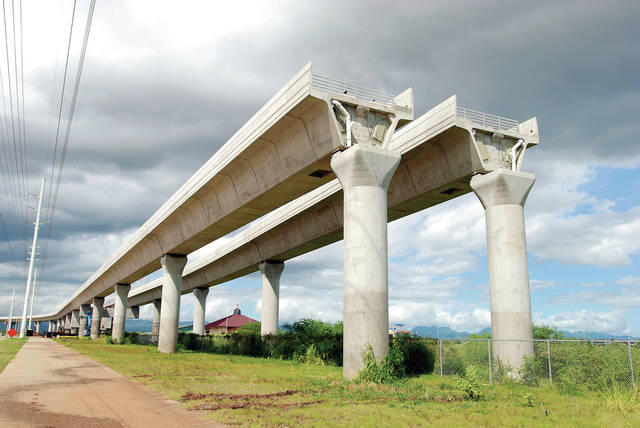HONOLULU — Officials prematurely awarded contracts for Honolulu’s commuter rail line a decade ago to minimize public criticism and show the project was moving along. But this practice dramatically swelled costs as plans changed, a new audit of the vastly over-budget project said Thursday.
The 20-mile-long rail line was estimated to cost $5.1 billion in 2012, but the forecast ballooned to $9.2 billion six years later. The rail is due to connect Honolulu’s western suburbs to the airport, downtown and the Ala Moana Center, Oahu’s biggest mall. Supporters hope it will prevent chronically bad traffic to downtown from getting worse as the population in West Oahu continues to grow.
The line is currently nearly halfway built, with a scheduled opening date of 2025.
The report blamed additional increases on low initial cost estimates, inflation and expenses associated with the start date being repeatedly pushed back.
“Over-promise, under-deliver. It has been the hallmark of the Honolulu Trail Transit Project’s nearly decade-long stop-and-go journey,” the report said.
The audit said city officials wanted to quickly award contracts 10 years ago because they were worried construction costs would spike as the economy improved after the recession.
They were further concerned state lawmakers would raid rail funds if the money went unused. The state was collecting and holding the money, raised by a surcharge on the general excise tax paid on Oahu, on behalf of the city.
The city awarded its first construction contract, for the line’s first 6.5 miles of elevated track to Kiewit Pacific Co. in November 2009 for $483 million.
But the project’s final environmental impact statement wasn’t published until June 2010. The Federal Transit Administration — which is funding $1.5 billion of the overall cost — didn’t give approval for the project to break ground until February 2012.
Multiple lawsuits challenging various aspects of the project also delayed construction.
The Honolulu Authority for Rapid Transportation, the agency building the rail line, had to pay Kiewit $108 million in penalties to account for the various changes in plans for that first contract alone.
The audit said prematurely awarded contracts have resulted in $354 million in change orders as of August 2017.
This amount doesn’t include significant change penalties associated with a $1.39 billion contract for Ansaldo Honolulu JV to design, build, operate and maintain the rail system, the audit said.
The city’s failure to adequately budget for moving electric power lines inflated costs further. Utility relocation costs jumped from $133 million to $391 million from 2012 to 2017.
Because the opening date for the rail line has been pushed back to 2025, the project faces additional major contract penalties that are unresolved, the audit said.
As costs have increased, public confidence in the project has deteriorated, the report said.
Andrew Robbins, CEO of the Honolulu Authority for Rapid Transportation, said in a statement that since January 2017, the agency has implemented a system that tracks all financial costs and has established a robust risk assessment and management system. The agency has a system to manage construction change orders and updates the HART board with monthly financial reports, he said.
The auditor said this is the first of four reports it plans to issue on the rail project.
Honolulu Mayor Kirk Caldwell said the findings were “a further call to action” for the HART board to maintain strong management oversight of the transit authority.
Hawaii lawmakers ordered the audit in 2017 when they passed legislation raising $2.4 billion in taxes to plug a funding shortfall for the project.
The legislation extended the general excise tax surcharge for Oahu for three years. It raised the hotel tax — also called the transient accommodations tax — statewide by 1 percentage point to 10.25 percent for 13 years, through 2030.

